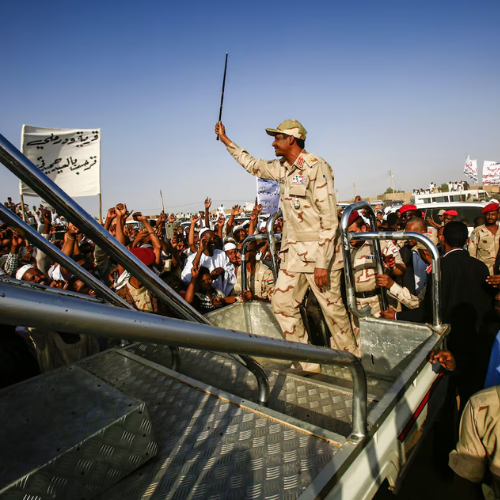The United States has officially declared that a genocide is happening in Sudan, marking a dark chapter in the ongoing civil war between two powerful factions in the country. The declaration came after mounting evidence showed that a paramilitary group called the Rapid Support Forces (RSF) has been systematically targeting civilians, particularly based on their ethnic backgrounds.
The U.S. Secretary of State announced that the RSF has been responsible for the murder of men and boys — even infants — and has committed widespread sexual violence against women and girls. Survivors and witnesses have shared horrifying stories of how the RSF targeted entire families as they fled their homes, killing those who resisted and making it nearly impossible for civilians to access food, water, and safety.
The atrocities don’t stop there. Reports indicate that the RSF and its allied militias have looted entire villages, stealing crops, vehicles, and gold, and leaving people with no means to survive. In the city of El Geneina, once home to over half a million people, between 10,000 and 15,000 civilians were reportedly killed last year alone. Children were murdered as they clung to their mothers, and others were thrown into rivers, according to witnesses. The violence is so extreme that the U.S. has now labeled these acts as genocide — one of the gravest crimes recognized under international law.
Sanctions Target Paramilitary Leader and Wealth Empire
In response to the horrific acts, the U.S. has imposed sanctions on the leader of the RSF, who controls a vast empire of wealth built on gold, weapons, and businesses. His forces, known for their brutality, have terrorized Sudanese civilians while enriching themselves through looting and illegal activities.
The sanctions also extend to companies connected to the RSF that are based in the United Arab Emirates, a country where the leader has business ties. This marks a shift in U.S. policy, as it directly calls out the leader and his network. Previously, U.S. actions targeted both sides of the conflict equally, but now it has singled out the RSF as the primary driver of the violence.
Despite promises made by the RSF leader in international peace talks to protect civilians, the attacks have continued unabated. Analysts and experts believe the sanctions could further damage the reputation of the RSF’s leadership and isolate them diplomatically, especially with countries in Africa that had previously welcomed them.
Suffering of Civilians Reaches Unimaginable Levels
The ongoing war in Sudan has plunged millions of people into crisis. Over 30 million Sudanese are in desperate need of aid, with widespread hunger and famine becoming the new reality for large parts of the country. Villages have been looted, and farmers have been displaced or killed, leaving no one to grow crops. The destruction of farming equipment, irrigation systems, and food supplies has made the hunger crisis even worse.
Sudan’s Government Slams EU for Targeting Military Leaders with Flawed Sanctions
In some regions, the RSF has been accused of deliberately destroying entire communities. Survivors have described villages being burned to the ground, people being kidnapped, and others being killed for resisting. In one area, 33 people were murdered in a single day when they tried to defend their grain from being stolen.
The U.S. has also accused Russia of fueling the conflict, with reports that Moscow has been receiving gold from Sudan in exchange for its support. This gold is helping Russia bypass international sanctions, further complicating the crisis in Sudan. Meanwhile, humanitarian aid groups are struggling to help those in need, as the RSF and other forces have repeatedly looted their supplies. Over $60 million worth of food meant for starving children has been stolen, and many aid workers have been attacked or driven away.
The Sudanese military, which is fighting the RSF, has also been accused of war crimes, including deadly airstrikes and arrests targeting specific ethnic groups. Both sides of the conflict have obstructed the delivery of humanitarian aid, leaving millions of innocent people to suffer.
The war in Sudan, which erupted in April 2023, has left an unknown number of people dead, as large parts of the country remain cut off from communication. Some estimates suggest the death toll could be as high as 150,000. The conflict has also created the world’s largest refugee crisis, with millions fleeing their homes in search of safety. For now, the suffering of Sudan’s people continues, with no end to the violence in sight.


